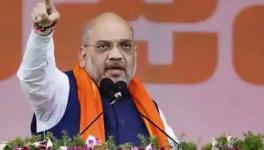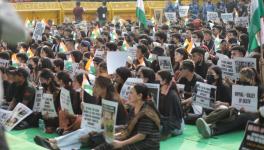Three Ways in which Neoliberalism Changed Politics in New India
There are subtle but what seem like long-term shifts in how politics is being pursued and constructed in the “New India” after 2014. The most notable of these is that the old binary of secular-versus-communal does not easily help identify political parties through their social agendas. Secular parties today are drawing leaders from the BJP and there is little hesitation in making them the party face in a region. The latest is Navjot Singh Sidhu, who was with the BJP but is now the Pradesh Congress Committee chief of Punjab. There are many other instances like his in Maharashtra, Telangana and Madhya Pradesh.
The reverse also happens, as when a spokesperson of the Congress became the spokesperson of the Shiv Sena. Besides, now, the Congress party and the Shiv Sena themselves are allies in Maharashtra. While the Congress party has made it clear that this alliance is merely tactical and their ideological differences continue with these rival parties, still, there is a blurring of ideological differences too. It happened, for example, when Congress workers joined a campaign to raise funds to construct the Ram temple in Ayodhya.
Now, the Bahujan Samaj Party (BSP) has pitched to build this temple faster than the BJP can. Further, independent Dalit-Bahujan scholars have demanded that a Dalit be made the chief priest of the Ram temple, which adds further fuel to this issue. Since no debate is possible on the veracity of the Ram temple at Ayodhya, parties have, instead, recalibrated what secular means. This has made it possible for the BJP to accuse Congress and other parties of being communal.
Alongside the secular-communal divide, the separation between the ruling party and opposition parties has also got blurred because of how politics is being imagined today. Today, the ruling party and its leaders speak as if they are in the opposition camp. They constantly demand accountability for mistakes made in the past by rival formations who ran previous governments. They talk of a golden future but refuse to be accountable in the present. Prime Minister Narendra Modi issues advice on how to manage the Covid-19 pandemic, but when there are complaints that the crisis is not being managed properly, he refers to protesters as “aandolan jeevis”.
We have a Prime Minister who blames the “system” and weeps out of helplessness but refuses to formulate a policy to manage Covid-19, while his government denies that people died due to a shortage of oxygen during the second wave. The alliance partners of the BJP, too, raise demands as if they are in opposition. Consider the recent lament by Janata Dal (United) leaders that the caste census is not being released by the central government. The JDU is an ally of the BJP in the Bihar government and it has said that it finds the dilly-dallying of the Centre on this issue unfortunate.
But the JDU does next to nothing when it comes to putting pressure on their ruling party or alliance. There is not even a symbolic threat of withdrawal of support, as was commonly seen in Indian politics during the coalition era. It is almost as if we have various political parties, but all are in opposition and struggling against “the system” and nobody belongs or becomes a part of the regime that is responsible for events today.
What is more, we also have a new phenomenon of “sleeping with the enemy”, where parties can appeal to a base that is socially opposed to them, to ally with them politically. So we hear the BSP appealing to the Brahmins for their votes while the BJP banks on the support of the OBCs to win elections. This flexibilisation of the social base has made it possible to polarise voters when political parties distance themselves from each other, abuse one another, and yet “come together” with their voters if that is what the poll arithmetic demands.
The case of Asaduddin Owaisi and his AIMIM (All India Majlis-e-Ittehadul Muslimeen) is a clear case of sleeping with the enemy. The success and failure of his tactics partly explain the difference in the results in Bihar and West Bengal Assembly elections. Now, a lot depends on how the dice falls in the coming elections in Uttar Pradesh. But in no way is this trend limited to the AIMIM. A similar role was drafted for Chirag Paswan, the son of Lok Janshakti Party founder Ram Vilas Paswan, in Bihar, and the Telangana Rashtriya Samiti (TRS). The success of this strategy depends on exerting pressure, including, it seems, the use of investigating agencies. This has led to the introduction of a new lexicon: “Team B” and “Team C” are now routine terms used to explain the proxy voices that create a narrative and help drum up the numbers required to swing an election arithmetically.
What explains these changes? To begin with, the neoliberal model of development has wiped out the large-scale differences between the economic policies of political parties. All of them speak a similar language and offer similar solutions, including the Left. The decline of Left parties has pushed politics towards the centrality of service delivery and made governance transactional.
The emergence of the Aam Aadmi Party epitomises the centrality of the service-delivery model of politics. Regional parties such as the Trinamool Congress, the TRS and the Dravida Munnetra Kazhagam vouch for transactional politics with wide-scale welfare measures. The only paradigm is neoliberalism, with a semblance of welfarism that was earlier referred to as “development with a human face”. This fundamental and near-absolute agreement between political parties makes shifting between the parties less arduous and ostensibly also more acceptable. Within the neoliberal paradigm, the shift to speculative financial capital, as opposed to the manufacturing sector, makes pragmatic claims, speculative announcements, and the “post-truth” part and parcel of the game.
The opaque nature of differences between political parties has given a larger and more definitive space to extra-political forces and strategies. The growing role of the RSS in pursuing its “cultural agenda” is at one end of this spectrum. The other end is occupied by Prashant Kishor and his role as a “political aide” or election strategist. He works for parties across the board and believes strategies can be developed, based on feedback, to win or lose elections. This has enlarged the role of big data, be it at the constituency level or even household data, which is a complex matrix of constituency-wise calculations and surveillance. It led to the speculative and unproductive debate of whether the recent electoral contests in Bengal were a competition between the “shrewdness” of Union Home Minister Amit Shah versus the “sharpness” of Prashant Kishor. The opposition parties now find themselves dependent on Kishor to bring them together and suggest a narrative. For the Congress party, Kishor may have to define even how it must reinvent itself.
What India needs is a new imagination. One that goes beyond neoliberal proclivities and the securitisation paradigm. Old binaries will have to get reinvented to mean new things that appeal to the changing sensibilities. As long as the opposition parties are unwilling to do this, politics will remain extra-political and cosmetic.
The writer is Associate Professor at the Centre for Political Studies in Jawaharlal Nehru University, Delhi. The views are personal.
Get the latest reports & analysis with people's perspective on Protests, movements & deep analytical videos, discussions of the current affairs in your Telegram app. Subscribe to NewsClick's Telegram channel & get Real-Time updates on stories, as they get published on our website.
























